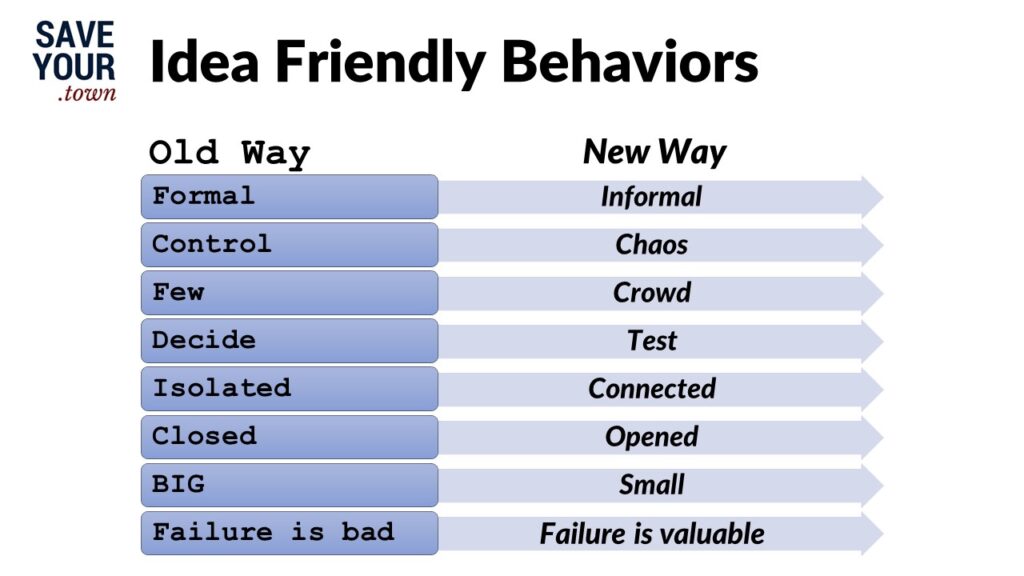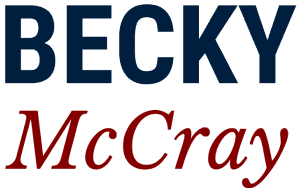Why I’d like to feed business plan competitions to the sharks
I’m not a big fan of business plan or startup competitions. I especially don’t like shark-style pitch competitions.
I do love that you’re taking action to support more startups and entrepreneurs. I like that you’re including training and support for everyone who participates. I can even live with the package of services you’re awarding as prizes.
Here’s what I have a big problem with: You’re trying to pick winners.
Let’s go back to the Idea Friendly behaviors list to see what’s wrong with that.
Old Way:
Formal, control, few, decide, isolated, closed, BIG, failure is bad
New Way:
Informal, chaos, crowd, test, connected, opened, small, failure is valuable

Which set of behaviors describes the competition/shark model? That’s classic Old Way. It’s a formal process closed except for those selected to join, with a few people in control who decide in isolation which one business idea to bet big on and hope it doesn’t fail.
What does New Way business encouragement look like? It’s going to be an informal, chaotic way of bringing together a lot of people, maybe even a crowd of people, all trying their business ideas with small tests, connecting everyone with resources and support, and helping them learn from the smallest failures possible. There is no judging.
- It’s a “come try your business idea” pop-up fair
- It’s a combination of training in business and actual doing of business
- It’s giving support to the people you find who are already trying tiny business ideas
Which way will generate more business startups? Which way generates more actual tries, more small fails, more learning?
If you’re with me in concept, but you already have a competition project you have to work with, let’s slide it a little more towards Idea Friendly on the behavior scale.
How can you make your existing business competition more Idea Friendly?
- Add a pop-up event where all the contestants can test out their ideas for a short try. Let attendees vote with their money.
- Spread the prizes out to a lot more than just one winner. Have a year’s worth of free rent? Don’t award the full year to one winner. Award one month each to 12 contestants. Split up your big prize package of services, too.
- Match the prizes to the contestants who could most use them. Give the marketing help to the one who has a promising start but just needs to reach more people, and give the counseling to the one who has never been in business before and is likely to have more problems that they aren’t sure how to deal with.
- Turn your judging panel into venture capitalists of new ideas. Their job isn’t to pick one winner. It’s to match up each person with the resources, opportunities to test, and services that will best help them succeed.
The old way feels more efficient because you’re focusing all the benefits on the one or few most likely to succeed. But how do you really know who will succeed? Even full time professionals can’t always predict correctly. For all their caution, venture capitalists and well-trained loan officers will admit they occasionally back businesses that fail.
And how efficient is it to award a bunch of services to a potential business that probably doesn’t need all of them?
Instead of aiming for efficiency, shoot for effectiveness. You’ll be more effective by backing the crowd than backing only one. You’ll be more effective by matching the services to the startups that need them.
Take the judging from a few selected judges and turn it over to the crowd. Let the people vote with their money. Because the ultimate judgment of whether a business will succeed belongs to the customers.
Keep shaping the future of your town,
Becky
PS – Media coverage of the Retail Apocalypse has been long on statistics and short on practical advice for local retailers. That’s why Deb and I are giving practical steps you can use right away in our Future of Retail webinar, and the recorded lesson part is available starting Tuesday. Time is running out to sign up.
